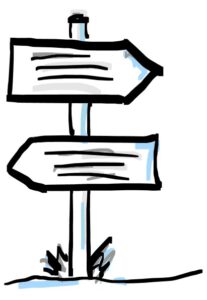How to be successful in times of uncertain change? The second part on smart change management.
In times of uncertainty
your own ability to act and flexibility increases, if you most radically accept change as part of everyday life. This is because it reduces stress and prevents tunnel vision and actions of short-sightedness – see Part 1.
Furthermore, knowledge about the structure of change makes the process controllable in the first place.
 So how can you know at every moment
So how can you know at every moment
that you are on the right way and make the right decisions? The answer: By working out orientation marks to which you can align yourself at any time.
And by trusting that you will overcome any difficulties that arise.
Neither of these is necessarily as easy
as it is written down here. But of course, it is possible. There is one thing, though, you will not be able to avoid: Getting to know yourself as well as possible by asking yourself questions. Answer these questions as honestly as possible:/1/.
 1. Who are you?
1. Who are you?
- What defines you as a person, employee, boss, team, company, etc.?
- Where do you come from, what is your history, your shaping?
- What character you have, what personality?
- What are your interests, preferences, talents?
Above all, gather your needs and values! These are your motivators. So:
- What do you need to be satisfied?
- When are you particularly happy or angry?
- What is so important to you that you want to have it always achieved if possible?
- And finally: What roles arise from this for you? What roles would you like to play? How?
2. What can you do?
Consider all your skills, all your know-how! Also in areas, which at first glance have nothing to do with the upcoming change. In uncertain change, everything can become important.
An honest approach to your strengths and also weaknesses is sovereign and protects you from overestimating and overtaxing yourself. So:
- Which education, which professional qualifications do you have?
- Which skills and abilities do you have, what hard and soft skills or other competencies?
- What experience have you gained so far?
- What have you already accomplished in the past? How?
- What are your strengths?
- What are you less good at or not at all?
- What you may still need to learn before you get down to work?
3. What do you want?
Life consists of all our decisions. Without exception, each (!) everyday decision brings us closer to what we want to achieve. Or further away from it.
If you want to be sure, particularly in uncertain times, that you are acting in the right way, orient yourself to how the world should be for you in a very fundamental and ideal way.
- What is your utopia?
- What are you wishing for – quite fundamentally and ideally?
- Who and how would you like to be?
And then do what brings you closer to that goal in the present moment!
 So mentally jump into the future and paint your ideal in the most beautiful colors! Who, what, how, and where will you finally be? Formulate what you really want!
So mentally jump into the future and paint your ideal in the most beautiful colors! Who, what, how, and where will you finally be? Formulate what you really want!
And then ask yourself: How did I get there?
The answers especially to this last question is the code of conduct that applies to you in any situation – and especially in times of change, so: NOW!
Tolstoy is supposed to have said
that happiness is not in being able to do what you want to do, but in always wanting what you do. This is especially true in Change:
Get involved. Influence the change as much as possible in your sense!
If you succeed in this, you use your freedom of action maximally. And also to the maximum confident and thus: self-determined.
Notes & Links
/1/ Attention: Firstly, this is difficult, because we are generally not accustomed to such questions. Because despite the trend to self-optimize, in this country we are rather incentivized for striving for our goals and to function according to standards that are not one’s own (school, training, and profession).
Therefore Attention No. 2: It is often unpleasant to tackle these questions because in the course of this we sometimes realize that we have often outlived our needs, desires, goals or perhaps even talents.
Be aware: All of this also apply to entire organizations.
 So how can you know at every moment
So how can you know at every moment